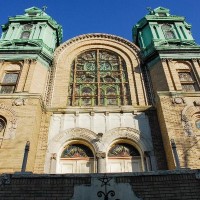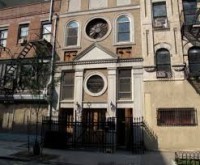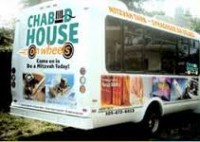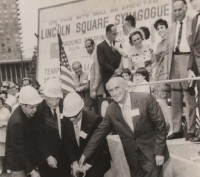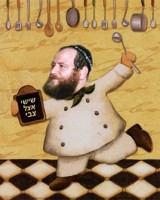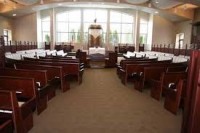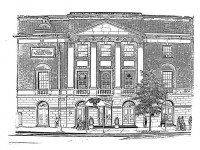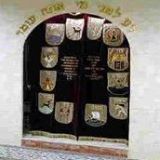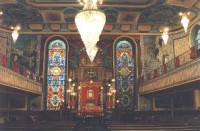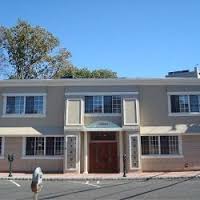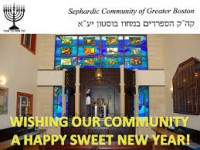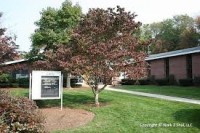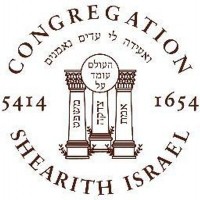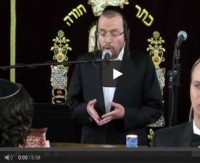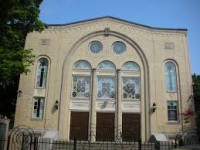Founded in 1906, Congregation Mount Sinai is the oldest continuously operating synagogue in Jersey City. Our distinctive building with its copper cupolas is a historic landmark and a symbol of our deep roots in the neighborhood. Services are held 10 a.m. Saturday and are conducted in Hebrew.
Men and women sit separately, and children are welcome. Join us for Shabbos or a holiday or contact [email protected] for more information.
Congregation Mount Sinai, founded in 1906, is the oldest continuously operating synagogue in Jersey City. Our distinctive building with its copper cupolas is a historic landmark and a symbol of our deep roots in the neighborhood.
We are a warm, welcoming, and traditional congregation with a modern perspective on Jewish life and learning. Members include longtime Jersey City families as well as newcomers of all ages who are participating in the economic and cultural revival of Jersey City and Hudson County.Visitors are likely to hear a wide variety of
languages and accents as our congregation is exceptionally international. Page numbers are always indicated, and we offer a welcoming environment for people to express, deepen and rediscover their Jewish heritage.
Founded largely by Jewish merchants who anchored the Central Avenue retail district, Congregation Mount Sinai flourished in the mid-20th century. At the time, The Heights was home to many first and second-generation American Jews.
During the 1960s and 1970s, many members moved to the suburbs but the area is being rediscovered by a new generation.
We are walking distance from Journal Square, Hoboken and Union City. During the week, The Heights is a quick commute to New York with easy access to the Light Rail, PATH trains, buses, jitneys, and Uber. Other highlights include the Central Avenue shopping district, Pershing Field, and stunning panoramic views of Manhattan from Fisk Park/Riverview Park.
We’re doing something special for Purim this year, and the more of you participate, the more special it will be! Sign up for our first-everMishloach Manot Project to send your friends and fellow Stanton members traditional Purim food baskets. We prepare them for you, you sit back and enjoy Purim, proceeds go to the shul, and everybody wins!
How does it work? You should already have received an e-mail with instructions and your very own log-in code. Simply log-in to the Purim Project site and select the people you want to send to from the list of participants ($5/person or $180 for as many names as you want). The baskets will be available to be collected at the shul on Purim night,March 23, and Purim morning, March 24, when you come for megillah reading. (Please note, each participant receives one basket with a list of all the people who gave to them.)
We are honored to host the Honorable Martin Shulman this Shabbat, February 6, for a special talk in honor of Parashat Mishpatim (Laws). Judge Shulman’s talk on “Selected Torah and Secular Social Laws – No Need to Re-invent the Wheel,” will take place at 12:15pm, after kiddush, and will be followed by mincha. All are welcome!
Celebrate Shabbat with Stanton and the rest of America next week!
We will be having a community Shabbat dinner on Friday night,March 4, for the nationwide Sabbath observance known as Shabbat Across America. Click here to sign up now! The cost is $35/person or $30 for shul members. Sponsorships of $100 include dinner for two. Please let us know if you would like a vegetarian entree.
Start the year on a
HIGH note!
High Holiday Services at
Chabad House in Miami Beach
Rosh Hashana 5776 – 2015 – September 13 -15
Yom Kippur – Sept 22-23
Chabad invites you to a warm, traditional, uplifting, and meaningful High Holiday experience.
Our doors are open to all; no membership fees or tickets.
Warm, friendly and non-judgmental atmosphere
No background, affiliation or prior knowledge necessary.
Hebrew-English Holiday Prayer Books
Traditional services blended with contemporary messages
Prayer instructions throughout the service
Insights and explanations into the Prayers, practices and rituals and inspirational stories
Festive Holiday Meals
Reserve Now for Amazing Rosh Hashana Dinner
All services are free of charge Donations are encouraged and warmly appreciated
No tickets required. Reservations are appreciated for Services, required for Festive Holiday Meals.
Everyone is invited, and no one will be turned away for lack of funds. Main thing is you come, and we are waiting to see you!
We look forward to personally greeting you!
Our Hebrew School
We create and environment that brings Judaism to life, fosters creativity and supports your child's unique style of learning. We use a unique approach which is hands-on and stimulates your child's intellect. Our curriculum has been designed to make a lasting, positive impact on the life of your child.
Judaism Comes Alive
Through drama, song art and stories we bring Judaism to life. OUr innovative methods make learning fun and memorable. We teach history by showing Jewish history, a method that encourages critical thinking. Through our mitzvah curriculum we emphasize each mivtzah's meaning for everyday life, in addition to the how-to ritual observance. Our hebrew language ensures that your child will be able to read from a Siddur (prayer book) No matter what synagogue your child affiliates with later in life, she or he will share the language of prayer with Jews around the world.
Our Staff
Our Hebrew School prides itself in our staff. Staff members are imbued with a desire to impart their love and knowledge of Judaism to their students. Recognizing that Hebrew School is an academic after-school program in addition to their regular school hours, our teachers endeavor to create an engaging program that keeps the interest of the child.
Educational Philosophy
Yeshiva Academy is founded on the principles of Chabad philosophy, which is a way of life that integrates the love of G‑d, intellectual knowledge and understanding of the Torah, and the appreciation of the uniqueness of every individual of the community.
Our administration and staff implement this philosophy in all areas of Judaic and General Studies while fostering a supportive environment for all our students.
Holistic growth in academic, spiritual, moral and social/emotions domains
Rigorous academics are pursued with a recognition that our students possess a variety of learning styles and abilities.
Students are taught to apply academic lessons from their practical settings to their daily lives.
Respect for each individual unique identity and talents forms the core of enhancing our students’ sense of self.
Ethics and moral values are explicitly taught, modeled, and practiced throughout the daily life of school.
Yeshiva teachers help our students realize that the Judaic and Secular worlds are interconnected.
Faculty strives to inspire and motivate each child to enjoy learning and a accept challenges while stimulating critical thought processes.
By empowering the head, heart, and soul, a Yeshiva education provides our students with knowledge, skills and attitudes necessary to be successful and to become members of con
Young Israel: Past, Present and Future
"The aims and purposes of the organization shall be to foster and maintain a program of spiritual, cultural, social and communal activity towards the advancement and perpetuation of traditional Torah-true Judaism; and to instill into American Jewish youth an understanding and appreciation of the high ethical and spiritual values of Judaism and demonstrate the compatibility of the ancient faith of Israel with good Americanism.
The organization shall promote cooperation among the constituent branches now existing and which may hereafter be formed, establish a close bond of kinship to the end that their individual and common problems may more easily be solved, and act as the federated and central body for the Young Israel Movement so that its influence as a force in Jewry may be felt and recognized in America and the world over."
(from the Preamble of the National Council of Young Israel Constitution)
Young Israel was born in 1912, when the primary aspirations of most American-born Jews were economic success and acceptance in American society. Jewish education was very low on their list of priorities, and as a result, was usually rudimentary, at best. Orthodox synagogues were exclusively Yiddish-speaking and permeated by an Eastern European atmosphere. American-raised Jewish youth who wandered into these synagogues typically found themselves shut out completely. It is not surprising that the Jewish youth of that era generally avoided the synagogue, attending only when expected by family custom. Although intermarriage was relatively rare, the distance between young Jewish hearts and minds and Jewish belief and practice was almost huge. It was in this environment that Young Israel was founded by a group of 15 visionary young men and women.
Its first activities were Friday night lectures in English (which was very controversial) on a variety of topics of Jewish interest. Three years later, the group formed a "Model Synagogue" with innovations designed to attract American-raised English-speaking Jewish youth, including participatory singing and youth programs. To enable people of all means to fully participate in synagogue services, Young Israel prohibited the auctioning of synagogue honors. The National Council of Young Israel required the minimum halachic standards of a mechitza, closed parking facilities on Shabbat and Yom Tov, and that each of its synagogues officers be Shomer Shabbat. Young Israel synagogues popped up across North America.
Young Israel envisioned itself as much more than a conglomeration of synagogues. Young Israel was the first on secular college campuses, with over 20 kosher dining halls and intercollegiate programs. Young Israel created an Employment Bureau for Sabbath Observers, in an era when most employees were expected to work 6 days a week. At Young Israel’s headquarters in New York, arms were packed for the Haganah defense forces of the not-yet-born State of Israel. The Free Soviet Jewry Movement was championed by the leadership of Young Israel. Young Israel has always been fiercely Zionistic, and promoted the rights of Jews to live throughout the Land of Israel. Young Israel placed an important role in gaining broad acceptance for advocating for the commuting of Jonathan Pollard’s sentence.
Today the National Council of Young Israel provides professional advice and cost-saving initiatives to 135 Young Israel synagogues (and beyond), advocates for the interests and views of our 25,000 member families, trains aspiring rabbis, supports rabbis in the field with biweekly question and answer sessions, aides communities in rabbinic searches and relations, coordinates informative Gabbai2Gabbai conference calls, provides exciting Parsha Nation curriculum for synagogue youth groups, runs inspiring Achva Summer Teen Experiences, shares best practices through monthly e-publications Shul Solutions and The Practical Pulpit, runs a three division basketball league in the New York metropolitan area, and serves as the sponsor of four senior centers at Young Israel synagogues which feed, educate and recreate the generation that made Young Israel great.
Future plans include providing spiritual inspiration and connection for Young Professionals and training Ashkenazic rabbis how to serve their Sephardic congregants. We are committed to work to maximize the resources of the Jewish community by working with our colleagues at other Jewish organizations and Jewish institutes of higher education and to maintaining a standard of excellence in everything we do.
LSS is a diverse and vibrant Modern Orthodox Congregation that provides religious, social, and educational services and outreach to the unique Jewish community of the Upper West Side. The synagogue strives to be a model in the integration of Halachic Judaism and contemporary life to the broader Jewish community.
In 1964, in the living room of an apartment in Lincoln Towers, a part-time rabbi from Yeshiva University named Steven Riskin took the budding Lincoln Square Conservative Synagogue by storm. His originality, charm and boundless energy captivated members and moved them to a more traditionally observant Judaism, in turn sparking a growing Jewish renaissance on Manhattan’s Upper West Side.
Before long, a new synagogue-in-theround made its debut at 200 Amsterdam Avenue, and the excitement at the renamed Lincoln Square Synagogue brought hundreds of young single professionals to the neighborhood, creating a vibrant scene for mixing and matching. Young families were also drawn to LSS, attracted by the dazzling teachings of Rabbi Riskin, assisted by Rabbi Herschel Cohen z”l and Rabbi Ephraim Buchwald, and the gorgeous melodies of Cantor Sherwood Goffin. “The New Orthodox” they called it on the cover of New York Magazine. Who knew? But as members struggled to navigate between the laws of Jewish tradition and the secular values of the surrounding society, Lincoln Square Synagogue began to see its destiny.
Just down the street from the temples of high culture at Lincoln Center, Lincoln Square Synagogue quickly established itself as a temple of an innovative kind, showcasing the classical and the contemporary, history and modernity. With joy and pride, the challenges of present-day living were brought into harmony with the ancient traditions passed down through the generations. The sacred liturgical texts of tefillah were infused with a new vitality as haunting, time-honored melodies shared the stage with the music of Shlomo Carlebach and The Rabbi’s Sons. The thirst for wisdom was quenched with the scholarship of Rashi and Rambam blended with the insights of 20th-century thinkers like Rabbi Abraham Isaac HaCohen Kook and Rabbi Joseph Dov HaLevi Soloveitchik. Everything old was new again.
What emerged was a synagogue with its own, unique, invigorating rhythm: home to meaningful and enthusiastic worship, to be sure, but also a place to establish lifelong friendships, build businesses and organizations, find soul mates and nourish the next generation through education and religious instruction. Thousands of Jews of all ages and backgrounds had come together to create a true makom kadosh, providing support for each other in times of sorrow and sharing joy in times of simcha. LSS was now a unified community whose commitment to Judaism and love of humankind extended beyond self and family to the world at large. You could walk in off the street for the first time, as so many did, and feel you’d been here before.
As the years flew by, the stunning success of Lincoln Square Synagogue brought with it newfound responsibility: to meet the needs of an increasingly diverse membership, an ever-expanding neighborhood and a 21st-century world. New solutions for new realities were required that would acknowledge the changing landscape, while staying true to the synagogue’s core principles and personality. Recognizing the difficulties faced by those forced to care for their children and their parents at the same time, and those older members in need of help, LSS became the first local Orthodox synagogue to add a part-time social worker to its core staff, guiding those needing support and companionship through the complicated maze of social service programs.
Identifying a resurgent thirst for Torah study on an individual, one-on-one level, LSS members founded the first full-time Modern Orthodox/Religious Zionist Kollel in the New York metropolitan area, offering the learned and the uninitiated new and exciting educational opportunities that reflected a love of Torah as well as eretz yisrael and am yisrael – the land and the nation of Israel.
And always mindful of the needs of the greater Jewish community, LSS members created the Lea Segre Tomchei Shabbos Fund providing free meals to those recovering from illness and childbirth or sitting shiva, as well as the Louis Lazar Benevolent Fund providing free religious articles like siddurim, mezuzot, and tefillin to those in need. All of this and weekly Bikur Cholim visits to Roosevelt Hospital every Shabbat afternoon, annual clothing drives, and a dedicated Chesed Fund that supports a variety of charitable causes in New York and across the country. As our sages teach, “olam chesed yibaneh” – acts of kindness build the world – and Lincoln Square Synagogue always does its part.
In 2013, LSS continued the next phase of its history and moved 100 yards south to 180 Amsterdam Avenue.
מיטל וצבי וילור צידון נישאו זה לזו בניו-יורק ב-2006. לצד ההחלטה על חיים משותפים רקמו השניים החלטה נוספת: לעשות משהו טוב למען הקהילה הישראלית בניו-יורק. מיטל וצבי רצו לחבר בין הישראלים הרבים שחיים בעיר ולספק להם מקום של חוויה יהודית וישראלית אותנטית. מזה שמונה שנים שמיטל וצבי מזמינים מידי יום שישי ישראלים רבים לארוחת שבת חגיגית אצלהם בבית בקווינס, פרויקט המוכר בתור "שישי אצל צבי".
"התחלנו מיד כשהתחתנו", מספר צבי. "אנשים תמיד אומרים, 'אל תתחבר עם ישראלים! ישראלים, במיוחד כאלה שחיים בחו"ל, הם אנשים קשים'. אבל אנחנו רצינו להראות צד אחר של הישראלים, להראות שאנחנו אנשים טובים ויפים. רצינו לחבר ולאחד את הישראלים, להוציא את הצד הטוב והיפה, שיהיה ישראלי מאוד. כשהתחלנו את 'שישי אצל צבי' גרנו בבית ממש קטן, עם מטבח קטנטן, אז התחלנו בקטן. בהתחלה היו באים רק שישה אנשים ומיטל התלוננה שלא מגיעים מספיק אנשים. אבל ידענו שאם נחכה ונתמיד בסוף זה יתפוס. ובאמת, לאט לאט, חבר הביא חבר וזה התחיל לתפוס. פתאום היינו שמונה אנשים ואחרי זה עשרה. היום, כל שבת, ברוך השם, יש אצלנו בבית בערך שלושים אנשים. בחורף, זה נע בין עשרים לשלושים איש, ובקיץ יושבים גם בחצר ומגיעים בין שלושים לארבעים איש. בראש השנה יושבים אצלנו בסלון, בחדר האוכל והחצר ביחד גם חמישים-שישים איש. ובל"ג בעומר האחרון היו אצלנו שבעים איש, שחגגו על-האש בחצר".
כשהוא לא מתפקד כבית חב"ד של איש אחד ואישה אחת, צבי מנהל חברה לשיווק באינטרנט ועוסק בהקמת אתרים וקידום בחיפושים. החברה שלו גם זכתה פעמיים ברציפות בפרס לקידום אתרים מטעם גוגל. אבל נראה שהמצווה של אירוח עשרות ישראלים לחוויית שבת מיוחדת מידי שבוע היא בעלת חשיבות לא פחותה מבחינת צבי, ובהחלט לא פחות תובענית מבחינת זמן ומשאבים.
איך אתם מכינים ארוחה לשלושים איש מדי שבוע?
"זה פרויקט שאנחנו עובדים עליו כל השבוע. ביום שלישי אני עושה את הפרסומים על מנת שזה יופיע בכל מקום וכדי שאנשים ידעו שיש להם לאן לבוא לשבת. אני מפיץ את הידיעה באינטרנט ובפייסבוק, ואני שולח הודעות טקסט לרשימת תפוצה של 200 אנשים. אחרי זה אנחנו עושים קניות בימים רביעי וחמישי. ביום חמישי אנחנו מתחילים את הבישולים. אנחנו כבר כל כך מיומנים בבישולים בכמויות האלה, שבדרך כלל אנחנו גם משלימים את הבישולים עוד לפני יום שישי. את הכל מיטל ואני מבשלים, לפעמים עם קצת עזרה מחברים".
למה יכול לצפות אורח בשישי אצל צבי?
"בארוחות 'שישי אצל צבי' הכי חשוב זה האווירה. יש אווירה נעימה ונינוחה, בלי ויכוחים ורעשים. יש אצלנו אווירה ביתית של שבת, עם קידוש ושירים, חלה ונרות דולקים. יש ארוחה גדולה, שהאורחים עוזרים להגיש, כמו בבית, ואחרי הארוחה הרבה מהאורחים נשארים לשבת, שרים ומדברים. מאז שהתחלנו כבר נוצרו אצלנו הרבה קשרים וחברויות וגם כמה חתונות שהתחילו אצלי בבית. מבחינת האוכל, אנחנו מכינים את הכל בעצמנו בבית. אנחנו משתדלים שלא להגיש שום דבר קנוי או מוכן מראש. בכל ארוחה אנחנו מגישים עשרה סוגי סלטים, חצילים וטחינה וחומוס שאנחנו מכינים. אנחנו מגישים מרק צמחוני, דג מרוקאי ובשר ועופות ותוספות לצמחונים, וקינוחים. כמעט לא קונים שום דבר תעשייתי. אנחנו רוצים שהכל יהיה ביתי וטרי ואורגני וכמה שיותר בריא".
איך מכלכלים ארוחה גדולה כל כך מדי שבוע?
"בשבע שנים הראשונות עשינו הכל לבד וכלכלנו כמעט את הכל מכיסנו. השנה אמרתי שנעשה ניסיון ונבקש סכום סמלי מכל אורח. כשהתחלתי לפרסם את הארוחות בתשלום, פנו אלי כל מיני אנשים ואמרו, 'צבי, עזוב אותך, אל תיקח כסף על הארוחה ביום שישי הקרוב, אני אשלם על הכל'. וככה יצא שאנשים טובים מכסים את ההוצאות כמעט בכל הארוחות מאז, ואנחנו יכולים להמשיך ולהזמין אורחים ללא תשלום".
בעמוד הפייסבוק של "שישי אצל צבי", חולקים צבי ומיטל בוידאו את המתכונים שלהם בעת ההכנה של הארוחות. אפשר למצוא שם בין היתר מתכונים מצולמים של עוגת תמרים פרווה ללא אפייה, חלות ארבעה דגנים או דג סלמון כבוש. הם גם חולקים עשרות מכתבי תודה והערכה משלל האורחים שביקרו בביתם.
איזה מין אנשים מגיעים לארוחות "שישי אצל צבי"?
"אני אוהב להגיד, 'בשישי אצל צבי, כל אורח הוא VIP'. מגיעים ישראלים מכל הבא ליד – סטודנטים, רופאים, בנקאים ואנשי נדל"ן. לפעמים מגיעים תיירים ישראלים שנמצאים בסביבה, או דיילות של אל-על. כל מי שרוצה לבוא מוזמן. אני רוצה להפיץ את הידיעה על 'שישי אצל צבי' כדי שעוד אנשים ידעו על זה שיש להם מקום לבוא בסוף השבוע לארוחת שבת ישראלית ולהיחשף לצד היפה של הישראלים כאן".
The Jewish Community Center – Chabad of West Queens
Mission Statement
To assist the residents of West Queens, achieve their spiritual, physical and emotional goals through exemplary educational, religious, cultural and social programming and celebration.
To provide support in times of need, illness or emergency
To promote and strengthen Jewish awareness, pride and identity to all Jewish individuals and families regardless of affiliation or background
To provide a warm community home where everyone is made to feel welcome & comfortable.
About our Center
The JCC – Chabad LIC was created with one goal in mind – to offer all Jews, even those with little or no background – a home, and an education and memories that will inspire them for a lifetime. We strive to evoke a sense of history, love for the land of Israel, and a genuine understanding of what Judaism is all about, and thereby develop strong Jewish pride.
Our center is founded on the principle that, while people embrace many levels of observance in their personal lives, there should be a place for no labels, and all affiliations. A place where people can develop a sense of community and enhance their own spiritual experiences of Judaism.
We realize that when it comes to spirituality, it is NOT "one size fits all." We have therefore created a multifaceted program with various sub organizational departments to cater to the different needs of the many parts which comprise a community.
Each department is managed by an individual of our staff that is fully dedicated to the development and expansion of that division. We aim to ensure maximum efficiency and quality of its programming so that everyone's needs can be catered to with the appropriate attention.
Whatever department you are involved with, the trademark feeling of warmth and creative spiritual excitement flows through every program. We provide everyone with a taste of joyful Judaism according to their own specific interests, while at the same time being part of the larger community through its dynamic unifying energy of love, acceptance and commitment to non judgmental spiritual growth.
rabbi and wife.jpgAbout Rabbi Zev and Rivka
Rabbi Zev Wineberg was born in Vancouver. From the age of twelve, he started Yeshiva, traveling within Canada, USA, South Africa, Israel and Budapest.
Rivka was born and raised in Crown Heights, Brooklyn, and from a young age began volunteering in Jewish day camps throughout the US, and Ukraine. She studied in Israel and upon completion began teaching within the Chabad community.
Both knew they wanted to work within the framework of Jewish Community Service.
In 2006, with the guidance of the Lubavitcher Rebbe, of blessed memory, Rabbi Zev & Rivka Winberg were given the opportunity to expand the work of Lubavitch in West Queens, by beginning to serve the spiritual needs of the Jewish population in the up-and-coming neighborhood of Long Island City. It is a fast growing suburb – attracting many Jews. There was a need to reach out to an overwhelming population which was uncommitted and under affiliated.
Zev and Rivka came with an agenda of Ahavat Yisrael, unconditional love for every Jew, to assist, help and infuse the community with the exciting programming and Jewish experience that have become synonymous with this vital organization. Through innovative programming such as public Menorah lightings, Passover Seders, lectures and cultural events, holiday workshops for children, The JCC – Chabad LIC quickly became a household name, reshaping the landscape of the Jewish experience in West Queens.
About The LIC Synagogue
Imagine worshipping in an atmosphere of total inclusion and acceptance, where you are welcome and encouraged to ask questions, where you are implored to be as non-judgmental of your neighbors as they are of you. This is the atmosphere that has been created in this Shul which we call home. Friday night services are lively Carlebach style and followed by L'Chaim and Kugel. Shabbat services are traditional and include a Dvar Torah – contemporary Torah thought from Rabbi Zev. The weekly Kiddush is focused on celebrating milestones in the community and our families.
All Jews are welcome regardless of background, knowledge, or level.
Davening Schedule
Sunday AM Daf Yomi 7:45 AM
Sunday Shacharis 8:30 AM (followed by shiur and breakfast)
Daily Daf Yomi: 6:45 AM
Daily Shacharis: 7:30 AM
Rosh Chodesh: 7:15 AM
Fast Days: 7:20 AM
Evening Night Beis Medrash: 8:00 PM
M, T, W – Gemara Shiur 8:15-9:00 PM
Evening Daf Yomi: 9:00 PM
Daily Maariv: 10:00 PM
Friday Mincha: 8 minutes after Candle Lighting
Shabbos Morning Shacharis: 9:00 AM
Ramath Orah has a unique legacy among Upper West Side synagogues. Founded in 1941 by Rabbi Dr. Robert Serebrenik, the synagogue’s original congregation was comprised of 61 refugees from Luxembourg who escaped the Nazi occupation under extraordinary circumstances. When they arrived in New York they immediately began the work of establishing a congregation in their new home. By 1942, they had founded Congregation Ramath Orah, naming it after the community they'd left.
We want our children to love the experience of shul so that they look forward to coming every Shabbat and holiday. We want our congregants to enjoy each others’ company, linger over Kiddush, laugh with one another, and be comfortable in our shul. For our members, we want to be the first place that they think of when it is time to celebrate a simchah, and the community they turn to in times of loss.
Worship – We are a place where Jews may worship together in an atmosphere that maximizes our ability to forge a relationship with G-d. Our community embraces spiritual, melodic prayer, from a Carlebach-style Kabbalat Shabbat, to festive holiday celebrations, and daily prayer.
Learning – We are deeply committed to study and education, and there are opportunities every week to learn with our rabbis and visiting scholars.
Chesed – We are dedicated to the ideals of bikur cholim (visiting the sick) and g’milut chasadim (doing good deeds), and the Ramath Orah Team of Chesed (ROTC) can often be seen visiting sick or elderly members of the community. We seek to integrate Chesed programs into the life of our community and to involve as many of our congregants as we possibly can in our Chesed programs.
Zionism – As a Jewish community, we are strongly committed to the State of Israel and encourage advocacy and activism. We believe that the creation of the State of Israel marks the beginning of the fulfillment of G-d’s promise to the Jewish people and foreshadows our ultimate redemption. Accordingly, the preservation of the Jewish State and the ability of its citizens to live in peace, safety and prosperity is a goal of our congregation, one which we not only pray for, but contribute our time and resources to help achieve.
Engagement – All members of our community are active participants, . While everyone is welcome to attend davening in our main sanctuary on holidays, we also host a monthly women’s prayer group and weekly Children’s Shabbat programs.
We are not judgmental of our fellow Jews, and we welcome all to our synagogue and accord honors in our services without regard to affiliation or non-affiliation of our members and guests. Ramath Orah seeks to be at the forefront of mutual tolerance and respect for Klal Yisrael. Ramath Orah, moreover, does not turn away anyone, either from participation in shul activities or from receiving honors, because of an inability to pay dues or make contributions.
We aspire to be a synagogue that makes every visitor, from the moment he or she enters our Shul, feel welcome and appreciated. We want every congregant to feel a personal obligation to reach out not only to visitors and new members, but to their fellow congregants. Click here to learn more about our hospitality program.
When I visited the synagogue I was treated as if I was a member of the community, it was great to feel at home and not like a stranger. I recommend it to everyone whether orthodox, conservative or reform. The next time I visit miami this synagogue will definitely be my first choice.
Very kind, nice and welcoming. Make one feel right at home…whether welcoming Shabbat, conducting Mincha or down for the holidays.
Best Sephardic shul in Miami Beach !!!!
"I recommend it to everyone whether orthodox, conservative or reform."
We are so excited to be a part of The Shabbos Project this coming Shabbat. Jews all over the world are committing to keeping Shabbat together, and there are events taking place all over the world, including at Shaare Ezra.
This Friday night we will be hosting a community dinner and invite everyone to attend. Each adult is only $18 and children under 10 are free. Please encourage your friends to join you in keeping Shabbat this week as we participate in this powerful project.
Please contact the Shul office at 305-674-6690 to make your reservations for Friday night. We will also be having lunch on Saturday, so plan on joining us for a most meaningful Shabbat experience. If anyone is able to host guest in their house this Shabbat, please let us know so we can make arrangements for those coming in to keep Shabbat.
Women and girls over 10 years old, do not forget that Thursday night is the The Great Big Challah Bake, where thousands of women will be gathering to bake challah together at the Miami Beach Convention Center. Doors open at 6:00. Thanks to the generosity of a donor, this event is free.
Weekly Shiurim:
Rav Singer Chevra Mishnayos Shiur: Daily between Mincha & Maariv
Mishna Berura Yomis: Daily after Maariv
Daf Yomi by Rabbi Fishelis: Sun – Thu at 8:00 PM
Mishlei Shiur: Sunday mornings, 7:45 AM
Women's Shiur in Tehillim: Monday
Rabbi Romm's Ha'amek Davar Shiur for men and women: Wednesday at
9 PM
Torah Topics: given by Rabbi Mayer Friedman. Friday mornings, 9:15 – 10:15 AM
Shabbos Shiurim:
Rabbi Romm–1 hour before Mincha
Daf Yomi–1 hour before Mincha
The Bialystoker Synagogue was organized in 1865 on the Lower East Side of New York City. The Synagogue began on Hester Street, moved to Orchard Street, and then ultimately to its current location on Willet Street, more recently renamed Bialystoker Place.
Our congregation is housed in a fieldstone building built in 1826 in the late Federal style. The building is made of Manhattan schist from a quarry on nearby Pitt Street. The exterior is marked by three windows over three doors framed with round arches, a low flight of brownstone steps, a low pitched pedimented roof with a lunette window and a wooden cornice. It was first designed as the Willett Street Methodist Episcopal Church.
In the corner of the women’s gallery there is a small break in the wall that leads to a ladder going up to an attic, lit by two windows. Legend has it that the synagogue was a stop on the Underground Railroad and that runaway slaves found sanctuary in this attic.
In 1905, our congregation, at that time composed chiefly of Polish immigrants from the province of Bialystok, purchased the building to serve as our synagogue. During the Great Depression, a decision was made to beautify the main sanctuary, to provide a sense of hope and inspiration to the community. The synagogue was listed as a New York City landmark on April 19, 1966. It is one of only four early-19th century fieldstone religious buildings surviving from the late Federal period in Lower Manhattan. Richard McBee and Dodi-Lee Hecht have both written in-depth articles about the building.
In 1988 the Synagogue restored the interior to its original facade, and the former Hebrew school building was renovated and reopened as The Daniel Potkorony Building. It is currently used for many educational activities. Our most recent project was the refurbishing of our windows.
The Synagogue has continued to be a vibrant and reputable force in the religious world. In recent years a substantial number of new families have chosen to make it their place for prayer and study.
Chabad of Fort Lee is founded on the principle that, while Jews embrace many levels of observance in their personal lives, there should be a place for all Jews no labels, no affiliations. They develop a sense of community and enhance the experience of being Jewish. They have successfully catered to hundreds of families from all backgrounds, offering Jewish educational programming in an accepting and innovative setting where all feel welcome. The goal is to create a positive Jewish experience for everyone as they strengthen their ties to the Jewish community.
Chabad of of Fort Lee is a place where every Jewish person is welcome – regardless of affiliation or level of knowledge. Our sole purpose is to create a warm welcoming environment to explore and experience our heritage in a non-judgmental and inviting atmosphere.
Chabad:
There's a palpable warmth at our synagogue services that melts away any embarrassment for those unfamiliar with, or new to, communal prayer.
Everyone feels at home. Come feel for yourself the family atmosphere that makes our services such a delightful experience.
Growth. Connection.
Two little words that symbolize what Chabad of Fort Lee stands for. Two big words that tell you what's so special about us.
Many people come to study or pray at Chabad. They come from all sorts of backgrounds, have many different religious affiliations, and function at all levels of Judaic observance.
But there is one thing they have in common: they are on a journey of growth – personal, intellectual, emotional, religious. They seek to expand their Jewish horizons, increase their knowledge in areas of Judaism, and for some, to grow in Jewish observance.
Warmly, gently, humorously, humbly, but persistently, our Rabbi, Rabbi Konikov, a world class Rabbi and scholar, urges everyone onward and upward, based on the teachings of Chassidism and the Lubavitcher Rebbe, Rabbi Menachem Mendel Schneersohn, that every Jew is precious and important because he is a Jew, and endowed with a G‑dly soul. One more Torah class. Try out a mitzvah. Explore your roots, take one step further on the path of Judaism; tomorrow maybe another. What when how much and how fast is up to you. But take a step forward. As long one lives one must keep on growing.
But a person, like a plant, needs warmth to grow. Our Chabad is legendary for its warmth, its friendliness, its caring, its hospitality. The words shul family are so often used here, that they've actually become a cliche. The Chabad has become the true center of our community.
History
SEPHARDIC COMMUNITY OF GREATER BOSTON
The Sephardim, the first Jewish community to reach America in 1492 together with Christopher Columbus, have been living in Boston for over 350 years. They arrived around the same time as the city of Boston was incorporated in the year 1630. Spanish Portuguese Jews escaping the inquisition and persecution, settled throughout the English Colonies, regaining their freedom of religion, and building their homes and businesses. The first documented Jew in Boston was Solomon Franco, a Sephardic Jew from Holland, who arrived in 1649.
Among the famous patriots living in Boston, was Moses Michael Hays, a Portuguese Sephardi. He and his family left Newport for Boston ahead of the British attack in 1776, at a time that Boston was devastated by the physical and financial effects of the American Revolution. For the next three decades, Moses Hays and his family would play key roles in establishing the financial and cultural institutions that would define post-Revolutionary and 19th-century Boston.
He opened a shipping office in Boston and was among the first merchants there to underwrite shipbuilding, trade and insurance to newly opened Far Eastern markets. In 1784, Hays become a founder and the first depositor of the Massachusetts Bank still doing business today as part of the Bank of America. He was an honorary member of the Boston Marine Society, and a founder of the Mass Mutual Fire Insurance Company and the Mass Marine Insurance Company.
Moses Hays was also active in a variety of civic projects. He donated to subscriptions to beautifying the Boston Common, to building bridges and turnpikes, and to Harvard College.
His son, Judah Hays, and his nephews, Abraham and Judah Touro (after whom Touro Synagogue in Newport, RI, the oldest synagogue in America is named) continued in his tradition. They helped establish Mass General Hospital (Abraham Touro’s portrait is on the wall, in the main lobby), the Boston Athenaeum and the Bunker Hill Monument (The base of the Bunker Hill Monument bears an inscription honoring Judah Touro).
Besides socializing with Paul Revere and Harrison Gray Otis, these Sephardic families were sincere to their Jewish roots. Their businesses were closed on Shabbat, kosher meat was being delivered from Newport, regular prayer services were being held at their homes, and their household library contained dozens of Hebrew books.
However, with all prosperity, the early Boston Sephardic Jews were considered alien-residents. No Jewish houses of worship were allowed in Boston. Furthermore, the Hayes, Touro, Lopez and many other Boston Sephardic families had to bury their deceased in Newport, since there were no Jewish cemeteries allowed at that time. Hence, they were all tied to New York and Newport’s Spanish Portuguese congregations, where they donated regularly and were members. Not until the Massachusetts Constitutional Amendments of 1821, were the Jews granted full rights of citizenship, shortly before a group of Sephardic Algerian Jews arrived in Boston in 1830.
In 1840, the Sephardic Jews in Boston were joined by the Ashkenazim, who had just arrived from Germany, settling at first in the old South End, just South of Boston Common. German immigrants began immediately to establish the traditional institutions that characterized Jewish communities around the world, now that they were permitted in Boston. In 1842, the first Jewish congregation in Boston, calling itself Ohabei Shalom (Lovers of Peace) was formed. Their first synagogue dedicated in 1852 was strictly orthodox. It housed a Mikveh (ritual bath) and a Talmud Torah for children. Two years later, Ohabei Shalom established the first Jewish cemetery in the city. Finally, after two centuries, Boston Jews no longer had to be buried in Newport or New York City. Judah Touro included in his will a large donation to Ohabei Shalom before his death in 1854.
As Ohabei Shalom and it’s break-away, Adath Israel (today Temple Israel), eventually both became Reform Temples, the Sephardic Jews, keeping strictly to their traditional lifestyles, joined and identified with the more religious congregations, and prayed in their synagogues.
In the 1870’s through the turn of the century, there was a group of primarily North African Sephardim, who held Sephardic services in Zion’s Holy Prophets of Israel (The Alfred A. Marcus Orthodox Synagogue) in Boston’s South End. They were using a Torah Scroll dedicated by the famous Sephardic philanthropist, Sir Moses Montefiore. As the Jewish community started to migrate to the suburbs of Roxbury, Dorchester & Mattapan, so did the Sephardim. They continued praying in the synagogues on Blue Hill Ave.
Mattapan is where the history of our Sephardic Community in Brighton began. Many Sephardic Jews were fleeing Egypt, after the rise of President Gamal Abdel Nasser in 1956, who subsequently expelled all the Jews and confiscated all their property. After the transition from Egypt, usually through France, where they waited a few years to receive their visas, they arrived in the USA. Approximately sixty families settled in Boston, by the Hebrew Immigrant Aid Society.
Hacham Elie Setton, born in Aleppo, Syria, was a Torah scholar and merchant in Alexandria, Egypt. He arrived in Boston in1963, and organized the first prayer services on Yom Kippur of that year. Together with his father-in-law, R’ Eliyahu Hamaoui, and his brother-in-law, the noted Hazzan of the Great Synagogue of Cairo, Shaoul (Charles) Hamaoui and his brother-in-law, Mr. Albert Habif (later elected treasurer of SCGB), they acquired space from Rabbi Moshe Gurkow, in his newly formed Shaloh House Hebrew Day School in Mattapan, and conducted the Yom Kippur services.
That year, in attendance, there were only three families with just nine men/boys that could be counted for the minyan. They invited an Ashkenazi friend to complete the minyan. The next year, as many more families arrived in Boston, they had dozens of people at the High Holiday services. Eventually, other Sephardim living in Boston from other countries of origin, (such as the Cohen families from Greece) found their home with this Syrian-Egyptian group. Hacham Setton became the spiritual leader of the entire Sephardic community, and together with the Hazzan, Shaoul Hamaoui, they lead the services, and began a new chapter in the lives of Boston’s Sephardic Jews.
In 1965, due to the deteriorating Jewish situation in Mattapan, the Sephardic community needed to move again. Many of them settled in Brookline, around Coolidge Corner. The High Holiday Sephardic services were conducted in the Social Hall of the Southern House, on Beacon Street.
The community kept on growing in Brookline, as still many more Egyptian families were arriving, and many other local Sephardim, by now, had heard of the Sephardic services, and hundreds came to join. Eventually, the High Holiday services were moved to the Chateau Garod Wedding Hall on Beacon St. Year after year, following the High Holiday services, the community yearned that one day they should merit to have a synagogue of their own.
In 1977, under the leadership of Dr. Charles Sasson, the Sephardic Community of Greater Boston filed the legal papers, becoming incorporated as a non-profit organization in the State of Mass.
In 1979, under the leadership of Dr. Charles Naggar & Dr. Martin Hanopole, together with Rabbi Ezra Labaton & Dr. Baruch Mazor, the High Holiday services were extended to Shabbat services too, meeting every week in the Beit Midrash of Young Israel of Brookline.
In 1983, under the leadership of Mr. Clement (Rahmin) Kodsi, the community accepted our beloved Rabbi Aaron Hamaoui, who eventually succeeded his uncle and father, as Rabbi and Hazzan of the community. Rabbi Hamaoui instituted the daily minyan and many Torah classes, which continue till this day. Over the years, the Rabbi has reached out and has made a major impact on hundreds of Jewish families and international college students studying in Boston.
On Yom Kippur 1988, under the leadership of Mr. Moshe Rahmani & Mr. Edmond Shamsi, a successful campaign was launched to finally build our own synagogue. Major contributions were received from the Shamsi and Zafarani families, and also from the Cochab, Elmaleh, Feuerstein, Gabbay, Kodsi, Naggar & Sitt families. Also, among those who donated generously were the Aghion, Ariel, Bauer, Foonberg, Habif, Hassan, Lester, Mayo, Mosseri, Sabetfard, Sanieoff & Schinazi families.
In 1989, the community inaugurated their first synagogue building, Kol Sasson Bnei Shaoul, at our present location, on Corey Road in Brighton. Hence, after three and a half centuries, the Sephardim finally had their first Sephardic synagogue building in the city of Boston.
For over a quarter of a century, this synagogue building has not only served the needs of the Sephardic community, it has also homed and been instrumental in founding many other important institutions of Jewish Boston, such as the Kollel of Greater Boston, Bais Yaakov Girls High School, Ohr Yisrael Yeshiva High School, and others.
In 2008, shortly after a major renovation and completion of the Abraham Picciotto Beit Midrash, several dynamic young professionals reached out to form the New Ashkenaz Minyan (NAM). This Minyan, which is integral to the Sephardic Congregation of Greater Boston, started in October 2008 and has ever since attracting many young adults, families and students. It is a very popular destination for newcomers to Boston.
The Young Israel of Sharon is a vibrant orthodox shul with a warm friendly, and relaxed atmosphere. Our ideology is inclusiveness. The Young Israel of Sharon brings together men, women, and children from a wide variety of backgrounds, with a broad array of religious styles and approaches, all unified by a commitment to authentic Torah life and spirit.
Young Israel of Sharon opened its doors in 1972 with just a minyan of families. In 2001, Young Israel moved to its present day facility. Today, we are experiencing 10% annual growth and have currently reached about 200 member families.
A variety of reasons contribute to Young Israel's growth: our family-oriented community; safe neighborhood to raise kids; modern diversity and openness; and our young and vibrant members. Another reason is Sharon’s affordable housing. Business Week online listed Sharon, MA as one of the top 20 Best Affordable suburbs in the Northeast.
Young Israel exemplifies the ideals of Modern Orthodox: serious Torah study and practice, together with an embrace of diversity and participatory openness to the best of contemporary culture and community.
Rabbi Dr. Meir Sendor is the spiritual leader of the Young Israel of Sharon, MA.
He is a recognized scholar in the field of Jewish History, specifically the history of Jewish mysticism, philosophy and medicine. He holds a rabbinic ordination from Yeshiva University, a Ph.D. with Distinction from Harvard University and a Master’s from Yale University. Rabbi Sendor lectures widely on his specialties and holds many classes on various Torah topics for all levels.
The Kehilla – A Brief Historical Review
K'hal Adath Jeshurun ("KAJ") was the name of the famed Kehilla in Frankfurt-am-Main, in pre-war Germany. It was established by Rav Samson Raphael Hirsch who was brought to Frankfurt in 1851 to lead the small remnant of the Orthodox community which had been decimated by the Reform. Disassociating ("Austritt" – Independent Orthodoxy) from the Reform and under the banner of his "Torah im Derech Eretz" approach, Rav Hirsch founded a school (the "Realschule") and rebuilt the Orthodox Frankfurt Kehilla to great success.
In the late 1930's, driven out of Europe by Hitler and his followers, a small number of German refugees who had settled in the Washington Heights section of New York joined together to establish a Minyan of their own where they could maintain their accustomed Minhagim and cherished tradition.
When Rav Dr. Joseph Breuer arrived in New York in February 1939, he was asked to become Rav of this Minyan which, at the time, was held only on Shabbos. Upon accepting this position, Rav Breuer immediately offered his home so that there could be regular weekday services. At the suggestion of the Rav, the minyan assumed the name of the famous Frankfurt Kehilla “K'hal Adath Jeshurun”. Like the Frankfurt Kehilla, this congregation was to become a full-fledged Kehilla to serve as a bastion of Independent Orthodoxy and a bearer of the "Torah im Derech Eretz" banner.
Rav Breuer was the grandson of Rav Samson Raphael Hirsch and the son of Rav Dr. Salomon Breuer, who had succeeded Rav Hirsch in his position as Rav of the Frankfurt Kehilla. Rav Dr. Joseph Breuer had served as the Rav of the "Klaus" synagogue in Frankfurt and as the Rosh HaYeshiva of the Frankfurt Yeshiva.
Rav Breuer saw the opportunity to rebuild the Frankfurt Kehilla of old, but at the same time making it a center that attracted not only people from Frankfurt and Germany at large but from many neighboring Kehillos of Europe. While in general the Kehilla continued the Minhagim of Frankfurt, some changes were introduced by Rav Breuer to accommodate members who came from other communities.
After the modest beginning, the Kehilla rented space in the Republican Club of Washington Heights. Soon the space proved too small and, in time for Pesach 1939, the hall of 90 Bennett Avenue was rented. During that year, a fire destroyed a large part of the hall and it became necessary once again to move to other quarters. The premises at 187th Street and Fort Washington Avenue were then rented until 1941, when the Kehilla purchased the building at 90 Bennett to serve as the Shul and, later, as the Yeshiva. The current Shul building at 85-93 Bennett Avenue was built in 1952 (and extensively renovated in 2001); the facility at 90 Bennett Avenue then began serving as a social hall. Originally called the Schuster Hall, it is now known at the Dr. Raphael Moller Auditorium.
In spite of great difficulties and enormous obstacles, Rav Breuer set out to establish the institutions required for an all-encompassing Kehilla. His initial effort called for the establishment and building of a Mikveh. Although he was advised by many that it was unrealistic to try to build a Mikveh at that time of war and economic uncertainty, Rav Breuer characteristically persevered and a building on 187th Street and Audubon Avenue was purchased and the Mikveh opened in 1943. The Mikveh was moved to its current location at 186 Street and Broadway in 1982 and extensively renovated in 2002.
Ever concerned with the welfare of the Kehilla, Rav Breuer asked Rav Shimon Schwab, then Rav of Congregation She’arith Israel in Baltimore, to join him in the Rabbinate in 1958. With his command of the English language, Rav Schwab was a special influence on the younger members. Under his guidance, the Yeshiva added a S’micha program. His erudition and oratorical ability gained for him and the Kehilla world-wide renown. For 22 years, Rav Breuer and Rav Schwab worked together to develop the Kehilla in all its aspects. Rav Breuer was niftar in 1980; Rav Schwab was niftar in 1995.
In 1987, the Kehilla asked Rav Zachariah Gelley to join the Rabbinate and assume the position of Morah D'Asrah and Av Bais Din. Rav Gelley had been the Rosh Yeshiva in Sunderland, England for 22 years. In 2006 the Kehilla invited Rav Yisroel Mantel of Lucerne, Switzerland, to join the Rabbinate.
"The Kehilla needs a Yeshiva" was a repeated appeal by Rav Breuer. In 1944 the Yeshiva, named Yeshiva Rabbi Samson Raphael Hirsch, was established and classes were held in the Shul building at 90 Bennett Avenue. Mr. Jacob Breuer was the elementary school Principal until he retired to Eretz Yisrael in 1986. Subsequent Principals were Rabbi Baruch Lichtenstein, Rabbi Reuven Drucker and Rabbi Nosson Adler; the present Principal, Rabbi Yehudah Moller, is a grandson of long-time president of the Kehilla, Dr. Raphael Moller. For decades Rabbi Emanuel Weldler served as secular studies principal of Junior High and High Schools. The Broadway Building was rebuilt as a school building in 1958 and the High School building next to the Shul was built in 1961. The Rika Breuer Teachers Seminary was established in 1963 under the leadership of Rabbi Joseph Elias. In 1973, the Mesivta and the Beth Medrash were relocated to a new building at 220 Bennett Avenue, named Beth Medrash al shem HoRav Shlomo Breuer.
The Beth Medrash was founded in 1958 by Rav Naftoli Friedler (the senior maggid shiur in the Yeshiva since 1948), who became the first Rosh Yeshiva. He was assisted by Rabbi Eliyohu Krieger who served the Yeshiva in various roles for over five decades. Rav Friedler was succeeded by, YB”L, Rav Yaakov Perlow, who in 1976 also assumed the position of the Novominsker Rebbe. During his tenure as Rosh Yeshiva the Kollel was started. In 1981, Rav Pinchos Kahn became Rosh Yeshiva; he was succeeded in 1986 by Rav Meir Levi, who is also the current rav of K’hal Adath Jeshurun of Monsey. Since 2009, Rav Yehoshua Rubanowitz has also held the title of Rosh Yeshiva. He has re-established a post-high school beis medrash program which has grown to over 70 bachurim.
Rav Breuer also oversaw the establishment of a Kashrus network, known for its integrity, as well as the gradual development of gemilus chessed institutions such as Chevros Kaddisho for men and women.
In 1947 Rav Breuer invited Rav Moshe Jacobovits to join him as Dayan of the Kehilla. Rav Jacobovits, a native of Lakenbach, Austria and a talmid of the Pressburg Yeshiva, assisted the Rav in the expanding Kashrus network and gave regular Shiurim. After his untimely passing in 1950, he was succeeded by Rav Eleazar Tarsis, a talmid of Rav Dr. Salomon Breuer and of Lithuanian yeshivos. In 1967, Rav Jacob Posen, a member of the Gateshead Kollel for many years, became the Dayan and in 1989 Rav Chaim Kohn became an additional Dayan of the Kehilla. Rav Eliyahu Glucksman joined the Kehilla in 1970 to serve the Rabbinate with particular involvement with the youth of the community and later became a Dayan of the Kehilla.
The burden of the administrative work of the Kehilla has been carried over the years by the Board of Trustees, headed first by Mr. Walter Joseph, followed by Dr. Raphael Moller, who served as president for 38 years. Rabbi Edwin Katzenstein succeeded Dr. Moller in 1980 and presided over the Kehilla at a crucial time after the petiros of Rav Breuer and Dr. Moller. Rabbi Katzenstein was succeeded in 1986 by Dr. Erich Erlbach, who served in that position until 2008. He was succeeded by Mr. Avram Cahn, who served for four years. Currently, Mr. Samson R. Bechhofer serves as president of the Kehilla.
Under Rav Breuer and his successors, the Rabbinate continues to adhere to the philosophy of "Independent Orthodoxy" which rejects both the legitimacy of other branches of Judaism and any dealings with organizations associated with them. KAJ also bases its approach and structure on Rav Hirsch's philosophy of "Torah im Derech Eretz", which encourages involvement in the modern world under the dominion of Torah without any compromise of loyalty to Torah and its precepts. Learning Torah is a core value of the Kehilla and there are many intensive shiurim and learning programs at various levels for men and women of all ages.
Unlike most Ashkenazic synagogues in the United States, which follow the Nusach Askhenaz ("Polish") liturgical rite, KAJ follows Minhag Ashkenaz ("German") in its liturgical text, practices, and melodies. Its first official Chazon was Mr. Abe Wertheim who was joined in 1949 by Mr. Robert R. Frankel (who officially “retired” in 1989 but continued davening at the Omud on many occasions through Shabbas Shuvah 2008 just days before he became ill and subsequently thereafter was niftar). In 1962, Mr. Frankel was joined by Rabbi David Kenner; after Chazen Frankel’s retirement, Rabbi Yisroel Meir Kenner served as Chazon together with his father for a period of 10 years. In 2001, Mr. Ezra Hes and Rabbi Ezra Lasdun were appointed Chazonim. Chazan Lasdun continues to serve as the Kehilla’s official chazon. The Chazonim, Baale Tefillo and the men and boys of the choir take great pride in perpetuating the familiar Niggunim of the Kehilla.
True to the concept of a full service kehilla, KAJ comprises a synagogue offering shiurim and lectures, a yeshiva, a beth medrash and a social hall. The Kehilla also provides its members with a Mikveh, the services of a Chevra Kadisha and a renowned Kashrus supervision.
קהילת שארית ישראל נוסדה במנהטן, ניו יורק בשנת 1654, על ידי מגורשי ספרד ופורטוגל, ונחשבת לקהילה היהודית הוותיקה בארצות הברית. בית הכנסת של הקהילה, המכונה גם "ספרדי-פורטוגזי" ("Spanish and Portuguese"), מתפקד כאורתודוקסי. ממוקם ברחוב 70 (מערב), ניו יורק.
הקהילה נוסדה ב-1654 על ידי 23 מהגרים יהודיים, שבאו מברזיל, ונחשבת לקהילה היהודית הממוסדת הראשונה בארצות הברית.[דרוש מקור] במשך השנים, השתתפו חברי הקהילה במאבק למען זכויות אזרחיות ליהודי ארצות הברית, ובהדרגה השיגו את מבוקשם. מכיוון שהקהילה הייתה הקהילה היהודית היחידה בעיר ניו יורק עד שנת 1825, שארית ישראל תפקדה בתור המרכז של החיים היהודיים, סיפקה מקום לתפילה ולימוד – הן חילוני והן תלמוד תורה, כמו גם מקום לשירותים דתיים (אוכל כשר, מקווה וכו') ומפגשים חברתיים.
Weekday Services January 31 – February 5, 2016 5776 – Mishpatim – Sunday – Friday – January 31 – February 5, 2016
SCHEDULE
Morning Services
Sunday 8:00 am
Monday – Friday 7:15 am
Sunday – Thursday 6:30 pm
Shabbat Services February 5 – 6, 2016 Mishpatim – 5776 – Friday Eve & Saturday – February 5 – February 6, 2016
SCHEDULE
Friday
Candle Lighting 5:00 pm
Services 5:00 pm
Saturday
Morning Services 8:15 – 11:45 am
Torah Reading: Mishpatim
Seuda Shelishit & Class 3:55 pm
Minhah & Arbit 4:55 pm
Sunset 5:19 pm
Habdalah 5:48 pm
Rabbi Ben Skydell has been the rabbi at Congregation Orach Chaim since January 2013. He follows an illustrious tradition of major American Rabbis to have served as the Congregation’s Rabbi, including Rabbis Michael D. Shmidman, Kenneth Hain and Simon Langer.
A native of Manhattan’s Upper West Side, Rabbi Skydell is a graduate of Yeshiva College and the Rabbi Isaac Elchanan Theological Seminary. He is a long-time faculty member of the North Shore Hebrew Academy High School, and the Drisha Institute for Jewish Education, and taught for several years at Yeshivat Hadar. Rabbi Skydell also served on the rabbinic staff of Congregation Beth Sholom of Lawrence, New York for nine years.
Rabbi Skydell’s areas of interest include the intersection of Halacha and history, the spiritual worlds of mussar and hasidut, and the historical world of the Rabbis of the Talmud. Rabbi Skydell’s dynamic and engaging presentation has made him a sought-out speaker on college campuses throughout the United States.
Rabbi Skydell is married to Shani, a dedicated social worker and teacher. They are the proud parents of Hannah, Emmie and Zacky.
Cantor Yaakov Y. Stark has been described as possessing “a voice of great beauty, clear and true…breathtaking, radiant, as though from another world.” A child prodigy, at the mere age of seven Yaakov Yoseph Stark was already thrilling congregations with his heartrending solos on the High Holidays. His talent and ability were nurtured by the distinguished cantors in his family, and through continuously listening to the master cantors of the golden age: Rosenblatt, Hershman, Kwartin, Pinchik, Glantz and Koussevitzky. Huge crowds of people regularly attend to savor the stirring songs and timeless tefillos eloquently enhanced and warmly delivered by their beloved cantor. Cantor Stark was privileged to perform at numerous sold-out concerts with the most prestigious philharmonic orchestras and finest choirs throughout the world. His lyric tenor voice has put him in constant demand as a guest cantor in synagogues worldwide. Cantor Stark resides in Williamsburg, Brooklyn, with his wife and children.
Rabbi Shmidman has served the Orach Chaim congregation and Upper East Side community since 1988. In addition to Rabbinic ordination, he holds a Ph.D. degree in Public Law and Government from Columbia University. He has served as Professor and Chairman of Political and Social Science at City University of New York and most recently as Dean of Undergraduate Jewish Studies at Yeshiva University. A widely recognized scholar, he is acclaimed as an outstanding teacher and inspiring preacher. An ardent Zionist, he has been honored by religious, social and cultural institutions in Israel and the United States.
Temple Beth Shalom, also known as the Tremont Street Shul, is a warm, friendly, traditional Jewish synagogue located near the center of Cambridge, Massachusetts. We embrace a wide variety of ages, backgrounds, and styles of worship. On Shabbat evening and morning we have two styles of services. Shabbat morning services are followed by a sit down Kiddush lunch to which everyone is welcome.
HISTORY
Temple Beth Shalom was formed when Temple Ashkenaz and Congregation Beth Israel merged in 1962. The merged Shul chose to use the Temple Ashkenaz building at 8 Tremont Street because it was newer. The name was changed to Temple Beth Shalom, in part to mark a new spirit of community cooperation.
As members of the original Cambridge Jewish community migrated to the suburbs, the synagogues in Cambridge consolidated in stages. The Tremont Street Shul was the last of original Shuls to remain in operation. In the 1970’s, all the local colleges decided to have a joint Simchat Torah celebration at TBS. Helped by the success of this annual event, the Shul began to attract new members from the young professionals in the greater Cambridge area and has grown steadily since then.
Our Shul underwent a major renovation in 1987. The basement vestry was made suitable for the Alef Bet child care center, which was founded at that time. A second renovation in 1994 transformed our balcony into a convertible classroom. A new office was added in 2004. Meticulous care was taken during each renovation to conserve our building’s historic character. We think our main sanctuary is one of the Jewish architectural jewels of the greater Boston area. Come and see for yourself!
The ancestors of Temple Beth Shalom include:
Congregation Anshai Sfard, organized 1896, chartered 1898, building at 83 Webster Ave., Somerville, merged into Beth Israel 1957
Congregation Beth Israel, organized 1900, building at 238 Columbia St.
Temple Ashkenaz, split off from Beth Israel over the issue of Ashkenazic vs. Sephardic ritual 1908, building at 8 Tremont St.– originally the home of Joshua Kaplan, house torn down and a new building erected 1924
Congregation Yavneh, chartered 1918, building at 8 Howard St. erected 1920, closed 1934.
For more information on our history and the history of Jews in Cambridge, see our on-line exhibit Centennial of the Jewish Community in Cambridge, an event we celebrated in 1996.
Temple Beth Shalom is a member of the Synagogue Council of Massachusetts.
ABOUT US
Reflecting the diverse population of Cambridge, Temple Beth Shalom represents a unique, creatively traditional approach to Judaism. Our goal is to make Jews of every affiliation feel at home. Impossible? Try us.
We have three styles of worship every Shabbat and two styles of weekday services. See the worship services page for more information on the styles available. Our minyanim come together later Saturday morning for a sit-down Kiddush. Our Kiddush includes a light lunch, singing, and much fellowship. All holidays are celebrated with services and appropriate observances.
We have an active 20s and 30s group that runs several social events every month.
The Temple hosts a number of educational activities, including the Alef-Bet Child Care, a Talmud class, and other adult education programs. Along with two other local congregations we support the Kesher after-school Hebrew School program.
A unique event at Beth Shalom is our famous erev Simchat Torah celebration which draws as many as 500 or more people. Part of the fun-filled service is the Hakafot, which takes the congregation out onto Tremont St. for singing and dancing well into the night. This service attracts a wide cross-section of the Greater Boston community, including special participation of local college Hillels.
Professional Learning Communities (PLCs) are powerful tools for improving schools, classrooms and informal learning spaces. PLCs (and their equivalent Communities of Practice for communal workers) allow education professionals to network with their colleagues, share insights and provide support for each other. CJE convenes participants with shared expertise and experience to collaborate and ensure maximum efficiency.
CJE currently facilitates the following professional learning communities for Baltimore Jewish Day Schools:
- Guidance Counselors/Psychologists
- Facility Managers
- Information Technology Specialists
- Librarians
- Marketing Professionals
In addition, CJE facilitates a Community of Practice for Baltimore Jewish communal professionals working with families with young children.

